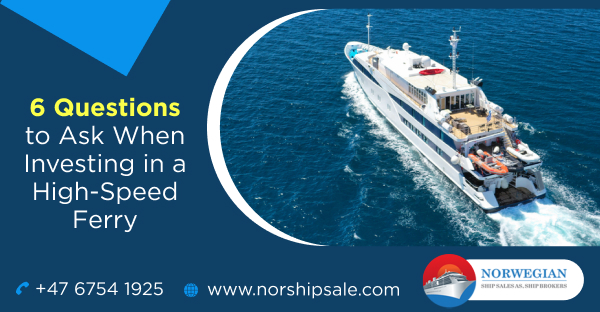Are you interested in acquiring a high-speed vessel for sale? Whether you are an experienced maritime investor or a first-time purchaser, investing in a high-speed vessel involves careful thought and research. We’ll go over the important questions to ask in this article before taking the plunge into ownership and assist you in setting yourself up for success when buying high-speed boats for sale.

6 Questions to Ask When Investing in a High-Speed Vessel
Here are some of the top questions that you should ask and the answers you can take a look at when investing in a high-speed vessel.
1. What Is the History and Condition of the Vessel?
To know the boat’s past and present state is very important. Start by asking for a complete record of maintenance to learn about how the boat has been cared for and any problems before. Also, ask if there have been any past accidents or harm and the way they were fixed. A detailed boat inspection done by an expert can give a deep evaluation of the ship’s structure, strength, machinery, and general state.
2. Are There Any Ongoing or Upcoming Technological Upgrades?
In the High-speed-changing world of ships and sea transport today, new technology is very important for improving how well ships work, making them more efficient, and keeping them safe. Ask about any current or future changes to technology like systems that help with navigating, the engines that move the ship forward or devices used for talking to others. Knowing the ship’s technical features and plans for future improvements will help it stay ahead in the market and meet industry regulations.
3. How Does the High-Speed Vessel Align with Environmental Standards?
As more attention is paid to caring for the environment, the high-speed boat must meet the necessary environmental rules. You should ask if the ferry you are planning to own is built adhering to the laws, and functions abiding by those rules about how much pollution it can cause, whether it uses fuel in a good way, and how it handles its garbage. Also, verify whether the high-speed vessel for sale has any green certificates or has done things to reduce its negative impact on nature.
4. How Transferable are Existing Contracts and Agreements?
It is important to know if the high-speed ship’s contract or rental deal can be transferred. Look over the current deals with customers, providers, and rule-making organizations to see if there are any limits or duties linked to changing who owns it. Talking to lawyers who know a lot about maritime laws can make it easier to understand tricky contracts and help change ownership without trouble.
5. How Does the High-Speed Vessel Handle Emergency Situations?
Safety comes first when we are on board, and it’s very important to know how high-speed ships act in emergencies. Ask about the ship’s plans for emergencies, like how people will leave the ship safely, what safety tools they have on board, and how well-trained their crew is. Also, check if the ship follows international rules for sea safety and the best ways to reduce dangers so that everyone on board, both travellers and staff, stays safe.
6. How are Insurance and Risk Management Handled?
It is very important to have insurance and risk-handling provisions when you own a ship. You should ask about the ship’s insurance, what it covers, how much it pays for each claim, how much you pay before the insurance starts paying and things that are not covered by the policy. Also, check how the ship manages risks. Look at things like when they fix it, checking for safety and plans for unexpected problems. Working with people who know a lot about boat insurance and risk management can help you understand what insurance you need and reduce money problems from owning a ship.
Further, here are some of the top features that you can take a look at when investing in a high-speed vessel.
Conclusion
Buying a high-speed vessel for sale is a decision that needs much thought and thorough reviewing. You should ask many questions about the boat’s past, its current state, any new technology it has, how it meets environmental rules, if you can transfer the contract to someone else, what to do in emergencies, insurance details and how to handle possible dangers so you can make smart choices and do well in sea business.

